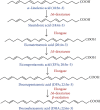Associations among Dietary Omega-3 Polyunsaturated Fatty Acids, the Gut Microbiota, and Intestinal Immunity
- PMID: 33488295
- PMCID: PMC7801035
- DOI: 10.1155/2021/8879227
Associations among Dietary Omega-3 Polyunsaturated Fatty Acids, the Gut Microbiota, and Intestinal Immunity
Abstract
Omega-3 polyunsaturated fatty acids (omega-3 PUFAs), which are essential fatty acids that humans should obtain from diet, have potential benefits for human health. In addition to altering the structure and function of cell membranes, omega-3 PUFAs (docosahexaenoic acid (DHA), eicosapentaenoic acid (EPA), alpha-linolenic acid (ALA), and docosapentaenoic acid (DPA)) exert different effects on intestinal immune tolerance and gut microbiota maintenance. Firstly, we review the effect of omega-3 PUFAs on gut microbiota. And the effects of omega-3 PUFAs on intestinal immunity and inflammation were described. Furthermore, the important roles of omega-3 PUFAs in maintaining the balance between gut immunity and the gut microbiota were discussed. Additional factors, such as obesity and diseases (NAFLD, gastrointestinal malignancies or cancer, bacterial and viral infections), which are associated with variability in omega-3 PUFA metabolism, can influence omega-3 PUFAs-microbiome-immune system interactions in the intestinal tract and also play roles in regulating gut immunity. This review identifies several pathways by which the microbiota modulates the gut immune system through omega-3 PUFAs. Omega-3 supplementation can be targeted to specific pathways to prevent and alleviate intestinal diseases, which may help researchers identify innovative diagnostic methods.
Copyright © 2021 Yawei Fu et al.
Conflict of interest statement
The authors declared that there are no conflicts of interest.
Figures
Similar articles
-
Short-term supplementation with ω-3 polyunsaturated fatty acids modulates primarily mucolytic species from the gut luminal mucin niche in a human fermentation system.Gut Microbes. 2022 Jan-Dec;14(1):2120344. doi: 10.1080/19490976.2022.2120344. Gut Microbes. 2022. PMID: 36109831 Free PMC article.
-
N-3 Polyunsaturated Fatty Acids and Gut Microbiota.Comb Chem High Throughput Screen. 2023;26(5):892-905. doi: 10.2174/1386207325666220701121025. Comb Chem High Throughput Screen. 2023. PMID: 35786331 Review.
-
The Polyunsaturated Fatty Acids Eicosapentaenoic Acid and Docosahexaenoic Acid, and Vitamin K1 Modulate the Gut Microbiome: A Study Using an In Vitro Shime Model.J Diet Suppl. 2024;21(2):135-153. doi: 10.1080/19390211.2023.2198007. Epub 2023 Apr 20. J Diet Suppl. 2024. PMID: 37078491
-
Impact of Omega-3 Fatty Acids on the Gut Microbiota.Int J Mol Sci. 2017 Dec 7;18(12):2645. doi: 10.3390/ijms18122645. Int J Mol Sci. 2017. PMID: 29215589 Free PMC article. Review.
-
Childhood adversity impact on gut microbiota and inflammatory response to stress during pregnancy.Brain Behav Immun. 2019 Jan;75:240-250. doi: 10.1016/j.bbi.2018.11.005. Epub 2018 Nov 3. Brain Behav Immun. 2019. PMID: 30399404 Free PMC article.
Cited by
-
Diet and Disease Activity in Patients with Axial Spondyloarthritis: SpondyloArthritis and NUTrition Study (SANUT).Nutrients. 2022 Nov 9;14(22):4730. doi: 10.3390/nu14224730. Nutrients. 2022. PMID: 36432416 Free PMC article.
-
Short-term supplementation with ω-3 polyunsaturated fatty acids modulates primarily mucolytic species from the gut luminal mucin niche in a human fermentation system.Gut Microbes. 2022 Jan-Dec;14(1):2120344. doi: 10.1080/19490976.2022.2120344. Gut Microbes. 2022. PMID: 36109831 Free PMC article.
-
Proteomic and Metabolomic Signatures of Diet Quality in Young Adults.Nutrients. 2024 Jan 31;16(3):429. doi: 10.3390/nu16030429. Nutrients. 2024. PMID: 38337712 Free PMC article.
-
Could Dietary Supplementation with Different Sources of N-3 Polyunsaturated Fatty Acids Modify the Rabbit Gut Microbiota?Antibiotics (Basel). 2022 Feb 10;11(2):227. doi: 10.3390/antibiotics11020227. Antibiotics (Basel). 2022. PMID: 35203829 Free PMC article.
-
Dietary Administration of Black Raspberries and Arsenic Exposure: Changes in the Gut Microbiota and Its Functional Metabolites.Metabolites. 2023 Jan 30;13(2):207. doi: 10.3390/metabo13020207. Metabolites. 2023. PMID: 36837826 Free PMC article.
References
Publication types
MeSH terms
Substances
LinkOut - more resources
Full Text Sources
Other Literature Sources
Research Materials




